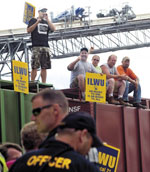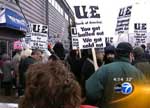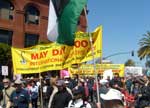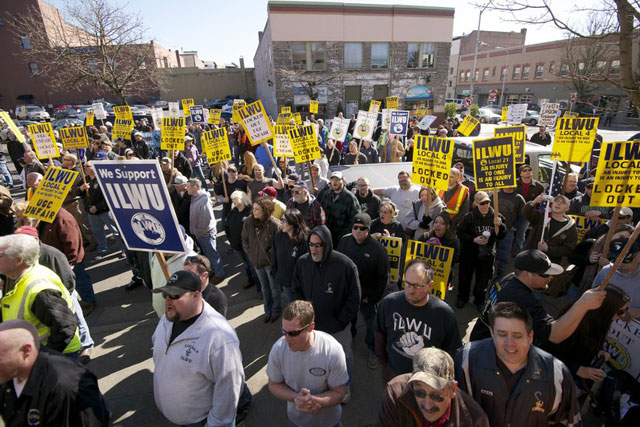
Showdown on West Coast Docks: The Battle of Longview
(November 2011).
click on photo for article

Chicago Plant Occupation Electrifies Labor
(December 2008).
click on photo for article

May Day Strike Against the War Shuts
Down
U.S. West Coast Ports
(May 2008)
click on photo for article
March 2013
Scabs Loading Ships – Grain Shippers Declare War on Union
ILWU Locked Out in Vancouver, WAFor Longshore Solidarity Actions!

Hundreds of longshore workers and supporters came out to March 8 rally in Vancouver to protest union-busting lockout of ILWU by United Grain/Matsui. International labor solidarity is key to victory.
(Photo: Troy Wayrynen/The Columbian)
Scab Cargo – Too Hot to Handle! For Mass Pickets on the Docks!
PORTLAND – At 8 a.m. on February 27, the United Grain Corp., owned by Mitsui, locked the members of International Longshore and Warehouse Union Local 4 out of its Vancouver, Washington terminal and began operating using management personnel and scabs. It was a long-planned move. Armed guards from the Gettier “security” agency have been in the terminal for months. “Replacement workers” were put up in area motels waiting for the call. Scab tugboats were contracted.
This is the first time in decades that a West Coast port facility has worked a ship with scabs. Not since the Inlandboatmen’s Union’s 1987 coastwise strike against Crowley Maritime have the shippers tried. When they did then, longshoremen and boatmen marched on a Redwood City dock in the San Francisco Bay Area to chase scabs off the vessel, never to return. Newspapers reported it as shades of the 1934 Big Strike with the ILWU flexing its muscle.
Already this past December, United Grain and two other members of the Northwest Grainhandlers Association (Columbia and Dreyfus) imposed a contract that includes 12-hour shifts, and effectively bypasses the union hiring hall, the key to the ILWU’s power. Those terms had been rejected by 94% of the longshore grain locals, yet the ILWU International instructed the membership to keep working under the imposed contract. This is a threat to the future of the union, the bastion of organized labor on the West Coast, and to its members’ livelihoods.
From the moment the union-busting contract was imposed, there should have been mass pickets shutting down all the terminals of the grain monopolies, with the threat to close every port on the West Coast – as well as East and Gulf Coast ports – if there was any attempt to operate with scabs. Now that this has happened, a call should go out from the union for dock workers everywhere to refuse to unload the scab cargo. All Mitsui cargo ships must be treated as strikebreakers and union-busters!
But you can’t call solidarity actions if Vancouver and other ILWU locals aren’t organizing actions themselves. Union officials have limited picketing at United Grain to three pickets, while filing an impotent legal complaint. Most ominous of all, they negotiated a dangerously concessionary contract with Temco (owned by Cargill) that includes many of the dangerous provisions that the other members of the NWGA are demanding – and they call this a “victory”!
Already a year ago, the ILWU tops rammed through a worst-ever contract at the new EGT terminal in Longview, Washington. It gave up union jurisdiction in the port, imposed 12-hour shifts and gave management and scabs the “right” to work behind picket lines and to set up its own hiring list, bypassing the union hall. It was sold as a “foot in the door,” but longshore militants warned it was a foot in the butt and would backfire when the NWGA contract came due. Sure enough, that’s exactly what has happened.
As we have noted before (see “Bring Out Workers Power to DEFEND the ILWU,” The Internationalist, November-December 2012), the grain shippers are making record profits. And despite inroads at EGT, ILWU power on the West Coast waterfront is still intact. Instead of trying to make nice with the bosses who are hell-bent on destroying the union, it’s high time for the ILWU membership to say enough!
On the East and
Gulf Coasts, under heavy pressure from
Washington, the International Longshoremen’s
Association reached a last-minute “partial
agreement” with the USMX employers
association, whose terms have not been
announced. But local agreements over work
rules have been held up. The ILWU and ILA
should join hands. Powerful coast-to-coast
and international
solidarity union action is needed
to DEFEND
THE ILWU before it is too late.
On March 8, a rally was called in downtown Vancouver to protest the lockout. But the focus is on the fact that United Grain is owned by the Japanese company Mitsui. The call to “End the Mitsui Lockout” complained that the company has refused to reach an agreement “with its American workforce.” It contrasted this to the “collective bargaining agreement with American grain exporter TEMCO.” Yet American-owned Cargill/Temco has one of the worst anti-union records in the industry. The rally marched to the United Grain headquarters to deliver a copy of the Temco contract. Instead, they should have headed to the terminal to set up mass pickets.
This flag-waving has no place in the workers movement, and will get the union nowhere. It sank the Boron workers’ struggle, when the ILWU tops picketed a British consulate instead of having Local 13 refuse to handle scab cargo from the struck plant. It is in flat contradiction to the ILWU’s long tradition of international labor solidarity. In fact, now that United Grain is loading ships with scabs, it is vital that dock unions in Japan and internationally refuse to work Mitsui ships. Doro-Chiba, the Japanese rail union, will be picketing Mitsui on March 15 in Tokyo.
In January, the West Coast coordinator of the International Transport Workers Federation boarded a ship at United Grain in Vancouver. The captain and crew, members of the Japanese Seamen’s Union, were well aware of the ILWU’s struggle. They informed the ship’s owner that under a solidarity clause in the JSU contracts, they would honor ILWU pickets. But there were no union pickets to respect. Nor were there any Local 13 pickets when the ship docked in L.A.
“Seafarers from around the world are grateful for the ILWU’s solidarity over the decades,” said the ITF delegate, and they “are eager to have the opportunity to support the ILWU” against the global grain merchants (ITFGlobal, 21 January). But the ILWU has to take the initiative. And there is reportedly sentiment brewing among longshore workers in Columbia River ports for such action.
Last week the executive board of Portland Local 8 voted a motion calling on “all longshore locals to take immediate action against Mitsui operations on the West Coast to defend the ILWU,” as well as for solidarity actions by ILA locals and affiliates of the ITF and the International Dockworkers Council.
Already, there has been a fight over the concessionary contract at Temco/Cargill. That “interim agreement,” which would be superseded by any agreement with the other NWGA shippers, includes a clause saying “The Employer has the right to select steady employees and their temporary replacements, five days or longer, for all categories of work except Utility.” If that union-busting provision sticks, it won’t be long before you can kiss the ILWU hiring hall goodbye.
The hiring hall was the key gain of the 1934 strike and has been the linchpin of the West Coast longshore union’s power ever since. When the U.S. Congress tried to outlaw it with the “slave labor” Taft-Hartley Act, part of the post-war purge of “reds” and labor militants from the unions, the ILWU stood its ground and finally forced the bosses and their government to back down. Now the International is prepared to give it up without so much as a whimper.
But not everyone in the ranks is willing to roll over and play dead. The day that United Grain locked out the ILWU, the Portland Business Journal reported that the union said that “five of its locals” had ratified the giveback Temco deal. Make that four. Portland Local 8, which with three active terminals is the largest grain port on the West Coast, voted the “interim contract” down.
Portland isn’t alone. Also last month, the Los Angeles-Long Beach Office and Clerical Unit rejected the settlement that their leaders had agreed to last December, ending a walkout that idled ten of the 14 terminals at that largest port in the U.S. and had the Obama administration panicked. (The OCU eventually knuckled under.) And don’t forget that Longview ILWU Local 21 never voted on the sellout EGT contract, even though they have a right to under the ILWU constitution.
What’s going on here? In recent decades, the top leadership of the International Longshore and Warehouse Union has moved a long way from the union’s militant past. Even under ILWU founder Harry Bridges, the union agreed to “modernization and mechanization” (M&M) contracts that undercut union gains. A “steady man” system was set up that, especially in L.A.-L.B. Local 13, fostered a labor aristocracy. But now they are putting the union itself at risk.
In spite of the rightward shift of the leadership, on a number of occasions, ILWU militants have been able to mobilize solidarity actions overcoming the opposition and foot-dragging resistance of the International leadership. The most notable recent example was the May Day 2008 West Coast port strike against the war on Iraq and Afghanistan, an overtly political strike, defying Taft-Hartley. It was the first time U.S. unions had struck against a U.S. imperialist war.
But as the Journal of Commerce (13 February) noted, “Since the 2008-09 recession, the ILWU dockworkers have been working closer with waterfront employers as well as with West Coast ports to shed the union’s image of being a militant and unreliable work force.” So, the maritime bosses’ paper wrote, for the union leadership, the contract rejection by the OCU was a “Black Eye,” which the International is still smarting over.
Like the Wall Street financiers who have shamelessly continued their looting and speculation that touched off the current depression, the worst since the 1930s, the West Coast grain shippers are playing for keeps. They smell blood. They sense that the leaglistic union leaders are ready to cave. In fact, the ILWU leadership under International president Bob McEllrath and coast committeeman Leal Sundet think like labor contractors rather than union defenders.
When Sundet negotiated the EGT contract last January, he declared it was “key to standardization of the grain export industry on the West Coast, particularly with respect to labor costs” and that it “guarantees profit throughout the market chain.” That comes straight from the ILWU Dispatcher (January 2012). Read it and weep. It’s no accident that Sundet used to work for the employers’ Pacific Maritime Association. Seems like he’s still working for the bosses.
The ILWU leadership is surrendering before the employers’ offensive. Over the past three decades, labor leaders everywhere have repeatedly capitulated to hard-nosed bosses, even to the point of sacrificing the union’s existence. Why is that? It is because they are a privileged layer, a bureaucracy, which tries to mediate between capital and labor. They are incapable of fighting the union-busting drive because their fundamental allegiance is to capital.
Does that mean that union struggle is hopeless? Not at all. It does mean that a real fight against the union-busters will require a new, militant leadership with a program of sharp class struggle instead of this belly-crawling class collaboration that threatens the survival of the ILWU. It will take hard work building an opposition within the union that stands on the best traditions of international solidarity and labor militancy that built the ILWU and are key to defending it today.
What’s needed is a leadership that can unite all waterfront workers, including the terribly exploited, immigrant port truckers. A leadership that can stand up to the bosses, their anti-labor laws and their capitalist politicians – in particular the Democrats, right on up to Obama in the White House, who sent the Coast Guard to defend EGT’s scab operation. Instead of flag-waving for the American bosses, we need a workers party to fight for a workers government, here and internationally, and a union leadership that says that loud and clear. ■
To contact the League for the Fourth International or its sections, send an e-mail to: internationalistgroup@msn.com